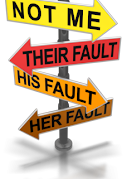Among the various things that, we learn, were created on the eve of the first ever Shabbat (Avot 5:8) are mazikim. ArtScroll editions of Avot translate this word as "destructive spirits". Other contenders include "demons" (Rabbi Lord Jonathan Sacks, Judah Goldin), "vandals" (Me'am Loez), "evil spirits" (Hyman Goldin), or leave it untranslated.
Back in October 2020, in "Mazikim pt 2: Refusal to Admit Responsibility for What Happens in One's Life" I discussed the notion that mazikim were not demons or evil spirits at all, but a coded or metaphorical manner of indicating the damage we cause through a refusal to face up to our own faults and deficiencies. In this context I'd like to quote the words of the late Chief Rabbi Joseph Hertz in his book Sayings of the Fathers (1945, discussed in a post last week at xxx). He too denies the real-world existence of mazikim as separate entities, but links them to man's yetzer hara, the inclination of every human to do wrong. He writes:
Demons figure in Rabbinic folk-lore, and belief in their reality was widespread; but, as here, they are held to be absolutely the creatures of God... Later Jewish teachers--the Gaon Samuel ben Chofni (died 1034) and Abraham ibn Ezra (1104-1167)--are among the first in the history of the world to deny the existence of demons. ...[D]emons, e.g. the forces of temptation and unrest in man, date from the dawn of Creation, and are part of the equipment of the human soul from its birth. It is true that, when these forces dominate us, they are "destroying spirits". But when these instincts are properly controlled, when we rule them, they are the driving forces in life. It is the capacity to fight evil, or to succumb to evil, that distinguishes man from the brute. And it is because of evil and suffering and temptation, that life is the glorious battlefield it is. We are at once the combatants and the combat and the field that is torn with strife.
These are powerful, emotive words which graphically invoke the inner conflicts that reflect the human condition. Chief Rabbi Hertz then offers a note of hope:
But in this struggle we are not left groping in the dark. Simultaneously with the destroying passions of man, the "Tables of the Law" together with "The Writing on the Tables" [these being other items listed in the same mishnah as being created on the eve of the first Sabbath] were created. As those instincts towards evil are part of the original constitution of man, so also are conscience and the holy laws of right and wrong, that are to control those instincts.
Is it not so much better, so much more constructive, for a person to bear these words in mind and apply them to his or her thoughts and deeds, rather than to cower in fear of non-existent demons.
